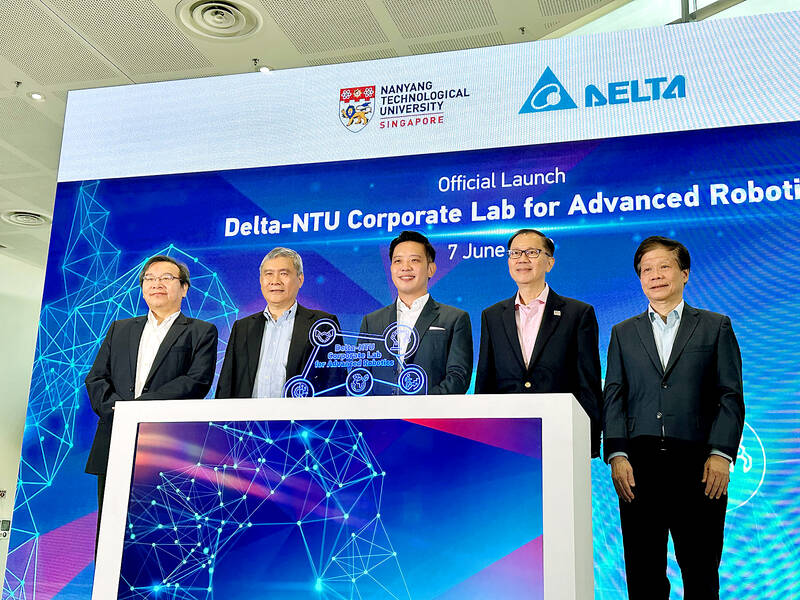Power and thermal management solutions provider Delta Electronics Inc (台達電) yesterday launched a lab for advanced robotic technologies in Singapore in collaboration with Nanyang Technological University (NTU).
The S$24 million (US$17.82 million) Delta-NTU Corporate Lab for Advanced Robotics aims to develop next-generation technologies over the next three years to address labor shortages in the manufacturing and intralogistics industries, Delta said in a statement.
Intralogistics is the logistical flow of goods and materials on a company’s site.

Photo: CNA
As the world grapples with a labor crunch arising from an aging workforce and declining birthrates, collaborative robotic systems are set to become a staple as businesses transition into “Industry 5.0,” Delta said.
Also referred to as the “fifth industrial revolution,” Industry 5.0 is a term used to describe the use of advanced technology and artificial intelligence-powered robots in workplaces.
Delta said that collaborative robotic systems are composed of human-touch inspired machines, smart sensors, radar and 3D sensor systems that collectively allow autonomous mobile robots to operate in a dynamic environment with human traffic, such as in hospitals and warehouses.
The company in 2016 worked with NTU in the research and development (R&D) of cyberphysical systems.
Their latest collaboration in the launch of the robotics lab would help industries solve key challenges and improve the quality of life of Singaporeans, Delta chairman Yancey Hai (海英俊) said in the statement.
“We intend to leverage Delta’s smart manufacturing prowess and autonomous mobile robot know-how, as well as our Delta-NTU R&D talent, to develop essential technologies for the next-generation of autonomous mobile robots,” Hai said.
The company launched the lab in a ceremony attended by Singaporean Minister of State for Trade and Industry Alvin Tan (陳聖輝), Delta Research Center general-director Chiueh Tzi-cker (闕志克), NTU president Ho Teck Hua (何德華) and NTU vice president Lam Khin Yong (藍欽揚).

Taiwan Semiconductor Manufacturing Co (TSMC, 台積電) secured a record 70.2 percent share of the global foundry business in the second quarter, up from 67.6 percent the previous quarter, and continued widening its lead over second-placed Samsung Electronics Co, TrendForce Corp (集邦科技) said on Monday. TSMC posted US$30.24 billion in sales in the April-to-June period, up 18.5 percent from the previous quarter, driven by major smartphone customers entering their ramp-up cycle and robust demand for artificial intelligence chips, laptops and PCs, which boosted wafer shipments and average selling prices, TrendForce said in a report. Samsung’s sales also grew in the second quarter, up

On Tuesday, US President Donald Trump weighed in on a pressing national issue: The rebranding of a restaurant chain. Last week, Cracker Barrel, a Tennessee company whose nationwide locations lean heavily on a cozy, old-timey aesthetic — “rocking chairs on the porch, a warm fire in the hearth, peg games on the table” — announced it was updating its logo. Uncle Herschel, the man who once appeared next to the letters with a barrel, was gone. It sparked ire on the right, with Donald Trump Jr leading a charge against the rebranding: “WTF is wrong with Cracker Barrel?!” Later, Trump Sr weighed

HEADWINDS: Upfront investment is unavoidable in the merger, but cost savings would materialize over time, TS Financial Holding Co president Welch Lin said TS Financial Holding Co (台新新光金控) said it would take about two years before the benefits of its merger with Shin Kong Financial Holding Co (新光金控) become evident, as the group prioritizes the consolidation of its major subsidiaries. “The group’s priority is to complete the consolidation of different subsidiaries,” Welch Lin (林維俊), president of the nation’s fourth-largest financial conglomerate by assets, told reporters during its first earnings briefing since the merger took effect on July 24. The asset management units are scheduled to merge in November, followed by life insurance in January next year and securities operations in April, Lin said. Banking integration,

LOOPHOLES: The move is to end a break that was aiding foreign producers without any similar benefit for US manufacturers, the US Department of Commerce said US President Donald Trump’s administration would make it harder for Samsung Electronics Co and SK Hynix Inc to ship critical equipment to their chipmaking operations in China, dealing a potential blow to the companies’ production in the world’s largest semiconductor market. The US Department of Commerce in a notice published on Friday said that it was revoking waivers for Samsung and SK Hynix to use US technologies in their Chinese operations. The companies had been operating in China under regulations that allow them to import chipmaking equipment without applying for a new license each time. The move would revise what is known